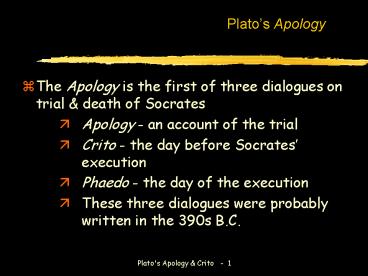Plato PowerPoint PPT Presentation
1 / 17
Title: Plato
1
Platos Apology
- The Apology is the first of three dialogues on
trial death of Socrates - Apology - an account of the trial
- Crito - the day before Socrates execution
- Phaedo - the day of the execution
- These three dialogues were probably written in
the 390s B.C.
2
Platos Apology
- Most of the dialogue is Socrates long speech to
the jury at his trial - 1. A special kind of wisdom
- Socrates survey
- His conclusion (21d)
- Knowing the limits of ones genuine knowledge
- Being able to distinguish between opinion and
genuine knowledge - sense of word apology
3
Platos Apology
- 2. The formal indictment (24 b-c)
- Not the real reason that Socrates was brought to
trial - What was the real reason?
- Some debate but probably his hostility to the
leaders of the government and to the democratic
form of government - see 31e.
4
Platos Apology
- Some secondary factors
- By their persistent questioning, Socrates and his
students annoyed many prominent Athenians - Socrates refusal to lend his support to the
governments prosecution of 10 generals after the
Peloponnesian War (32b). See Tarrants note 55
on p. 220.
5
Platos Apology
- 3. Socrates apology
- The sense of the word apology here
- Are two apologies (closely related)
- (1) Care for the soul (30b)
6
Platos Apology
- (2) The classic passage . . . The unexamined
life is not worth living . . . (Grube trans.
38a) Tredennick Tarrant . . . Life without
this sort of examination is not worth living . .
. - Cf. The analogy to a fly buzzing around a
lethargic horse (30e-31a)
7
Platos Apology
- 4. The conviction sentencing
- Convicted initially by a vote of 281 to 220
sentenced to death - Socrates is invited to propose an alternative
penalty - His response
- The second vote for the death penalty
8
Platos Apology
- 5. Closing comments on death
- Death is one of two things annihilation or
change Socrates does not argue for one or the
other here - The latter is a form of immortality
- In either case, it is nothing to fear
9
Platos Crito
- Platos Crito
- An account of the day before Socrates execution
- 1. Socrates Plato on the opinions of the
masses (44d) - Socrates Plato's elitism
10
Platos Crito
- 2. Socrates reasons for refusing to escape
- Some secondary reasons
- fate
- old age
- is immoral to do wrong in response to wrong (49b
49d)
11
Platos Crito
- The primary reason The social contract theory
- main elements
- an agreement (49e, 51e)
- analogy of state to parents (51b-d)
- tacit
- when made? (51d)
- emigrate (51d)
- no violence (51c)
12
Platos Crito
- What if one disagrees with the laws and rules of
ones state? (51c) - Only 2 options (51b-c, 52a)
- A secondary reason for refusing to escape
- A consequentialist argument (50b 53b)
13
Platos Crito
- A critique of Socrates arguments in the Crito
- If one disagrees with the laws of ones state,
are there only 2 options? - Difficulties with the right to emigrate
- The scope of the contract - how does it include
non-participants? - Joseph Tussmans surrogate theory
14
Platos Crito
- Critique (contd)
- What if one makes an agreement to an evil
government? Socrates tries to cover (49e). Does
he succeed? - The paradox
- Hanna Pitkins theory of hypothetical consent
15
Platos Crito
- Critique (contd)
- In his death, was Socrates a martyr for free
speech? Was he the first martyr of free
speech? (I.F. Stone) - A brief history of the social contract theory
after Plato - Platos Crito is the locus classicus
- Thomas Hobbes, Leviathan (1651)
16
Platos Crito
- John Locke (English, 1632-1704) - Two Treatises
of Government (1679-83) - Jean Jacques Rousseau (French, 1712-1778) - Du
Contrat Social (1762) - Thomas Jefferson (United States, 1743-1826) -
Declaration of Independence (1776)
17
Platos Crito
- John Rawls (United States, b. 1921) - A Theory
of Justice (1971)

